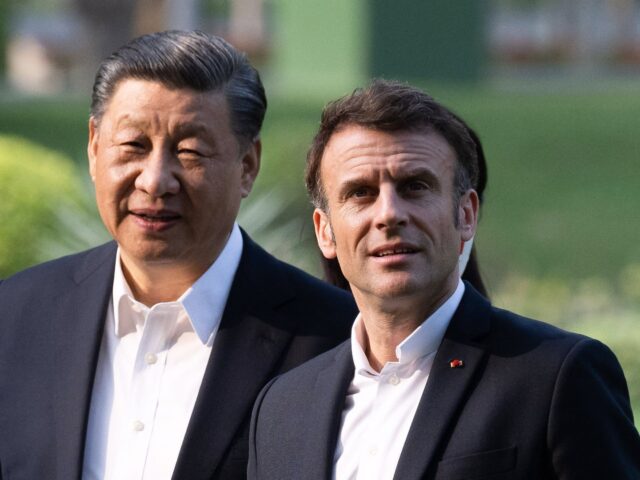French President Emmanuel Macron has argued that Europe needs its own “strategic autonomy” from the United States, potentially including its reliance on the dollar and should avoid following America into any conflict with China over Taiwan.
On the plane ride back to Paris from a three-day state visit with Chinese dictator Xi Jinping, President Emmanuel Macron once again expressed his desire for Europe to become the world’s “third superpower” and — of course — with France in the leadership position.
In an interview with the POLITICO website, Mr Macron, who is a leading proponent of the formation of a fully-fledged EU Army, emphasised the need for “strategic autonomy” for Europe from the whims of Washington. A key element of this for the French president would be ramping up the European defence infrastructure in order to reduce its reliance on American arms manufacturers.
More extraordinary, however, was Macron’s comments concerning the use of the dollar as the world reserve currency, saying that Europe should look to reduce its dependence on the “extraterritoriality of the U.S. dollar”. The comments would likely be music to the ears of those in Moscow and Beijing, both of whom have been seeking to undermine the petrodollar.
Communist China and Vladimir Putin’s Russia are attempting to forge a “New World Order” in which the rules of the world are set in Beijing and Moscow instead of Washington, a Lithuanian MP has told Breitbart News. https://t.co/xnAkwudUEF
— Breitbart News (@BreitbartNews) March 1, 2022
The petrodollar has been the backbone of the global economy since 1973 when U.S. President Richard Nixon made a deal with Saudi Arabia to only trade oil in U.S. dollars, a move that was quickly adopted by the Organization of the Petroleum Exporting Countries (OPEC).
Yet, the system has come under increasing threat from the so-called BRICs alliance of emerging economies (Brazil, Russia, India, China, and South Africa), which have actively been attempting to convince major oil suppliers and other countries to accept currency besides the dollar. Most recently, China and Brazil signed an agreement to conduct bilateral trade in their own currencies and not the dollar.
A main buffer to the collapse of the petrodollar — which could be disastrous for the American economy — has been the fact that the European Union has continued to back it and continue to conduct trades for oil in American currency. However, the bloc has made previous noises about trying to create its own euro version of the petrodollar.
The Chinese state overtook the United States as the European Union’s top trading partner in 2020, as ties between Brussels and the communist dictatorship in Beijing continue to deepen. https://t.co/RzgCixukoq
— Breitbart London (@BreitbartLondon) February 17, 2021
Upon taking office, President Joe Biden promised a return to close cooperation with America’s allies after President Trump had ruffled feathers in Europe over demands that NATO powers such as France and Germany actually pay their required defence spending. Yet, amid persistent foreign policy failures from the bungled withdrawal from Afghanistan to the war in Ukraine, it appears that Biden may have failed on rallying allies as well.
Demonstrating this, Mr Macron argued that Europe should not follow America into a potential war with China should Beijing launch an invasion of Taiwan, which although not a technical U.S. ally on paper has been unofficially under America’s protection since the nationalist Chinese government of Chiang Kai Shek fled to the island following the civil war with Mao Zedong’s communists in 1949.
Taiwan, which has since maintained its own independent government, military, culture, and written language, is also seen as crucial geopolitically due to its status as the world’s premier producer of semiconductors used in modern technology.
Mr Macron said that the “great risk” is that Europe “gets caught up in crises that are not ours, which prevents it from building its strategic autonomy.”
“The paradox would be that, overcome with panic, we believe we are just America’s followers,” he continued. “The question Europeans need to answer … is it in our interest to accelerate [a crisis] on Taiwan? No. The worse thing would be to think that we Europeans must become followers on this topic and take our cue from the U.S. agenda and a Chinese overreaction.”
“If the tensions between the two superpowers heat up… we won’t have the time nor the resources to finance our strategic autonomy and we will become vassals,” Macron added. “Europeans cannot resolve the crisis in Ukraine; how can we credibly say on Taiwan, ‘watch out, if you do something wrong we will be there’? If you really want to increase tensions that’s the way to do it.”
EU Council President Charles Michel argued against offering an "olive branch" to Russia but declared that in order to accomplish the EU's green agenda goals it should seek deeper economic ties with Communist China — despite its long-list of atrocities https://t.co/c2CYNXbjkU
— Breitbart London (@BreitbartLondon) February 21, 2022
It is unclear, however, if Mr Macron is actually in a position to lead Europe on such issues, given his increasingly diminished status domestically, with millions of French taking to the streets over the past month against his administration.
Opinions on ties with Communist China are also divided across the EU, with even the top brass of the bloc seemingly at odds over the issue, with EU Council President Charles Michel favouring increased trade with Beijing while EU Commission President Ursula von der Leyen has been slightly more critical.
Von der Leyen, who accompanied Macron on the trip to China last week, said “Stability in the Taiwan Strait is of paramount importance,” adding: “The threat [of] the use of force to change the status quo is unacceptable.”
Breitbart London also supports a 'One China' policy… under Taipeihttps://t.co/osluwsOlii
— Breitbart London (@BreitbartLondon) July 21, 2022
Follow Kurt Zindulka on Twitter here @KurtZindulka

COMMENTS
Please let us know if you're having issues with commenting.